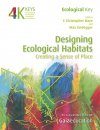![Designing Ecological Habitats Designing Ecological Habitats]()
Click to have a closer look
About this book
Biography
Related titles
About this book
Designing Ecological Habitats is the third volume in the Four Keys to Sustainable Communities series and is an important and eloquent exploration of humanity's limits to growth, addressing the problems arising from climate change, habitat destruction, population growth and resource depletion.
This is not a book of theoretical ideas but an anthology of solutions, of experience, tried and tested, from experts all over the world. The designs and practices included in Designing Ecological Habitats present a vision for the future, already tested out in eco-villages, sustainable communities and projects in many countries. These are practical low carbon solutions which provide significant improvements in the quality of life.
Designing Ecological Habitats is an anthology of work by writers who have created, built, lived in and thrived in eco-developments, and addresses green building; food resources; appropriate technology; and restoring nature.
The Four Keys series represent the four dimensions of sustainable design – the Worldview, the Social, the Ecological and the Economic. This series is endorsed by UNESCO and is an official contribution to the UN Decade of Education for Sustainable Development.
Customer Reviews
Biography
E. Christopher Mare discovered a Permaculture Design Course in 1993 and has been a full time student ever since. A self-designed B.A. was the world's first effort at organizing the emerging discipline of Ecovillage Design into a formal degree. Two Master's degrees later, he is currently preparing for his doctoral dissertation through Fielding Graduate University in Santa Barbara. Mare was selected to be the Curriculum Coordinator during the production of the Ecovillage Design Education (EDE) curriculum and later went on to edit the Gaia Education Design for Sustainability curriculum offered through Open University of Catalonia in Barcelona. In 2002, Mare set up an educational non-profit Village Design Institute which will one day secure a land base for the establishment of 1) a research, training, and demonstration site; 2 an Academy of Village Design; and 3) a community of contemplative scholars. This project most likely will be called an 'ecovillage'.
Max O. Lindegger is a respected and sought-after teacher in the disciplines of sustainable systems. His dynamic teaching style is born of 30 years of hands on experience and leadership in the design and implementation of practical, workable solutions to the challenges of sustainability. This depth and breadth of knowledge communicates naturally to his audience. The value of this knowledge-from-experience is recognised in frequent invitations to present lectures at international symposia and conferences on themes such as Environment, Ecology, Sustainability, Permaculture, and Ecovillage Design.



































